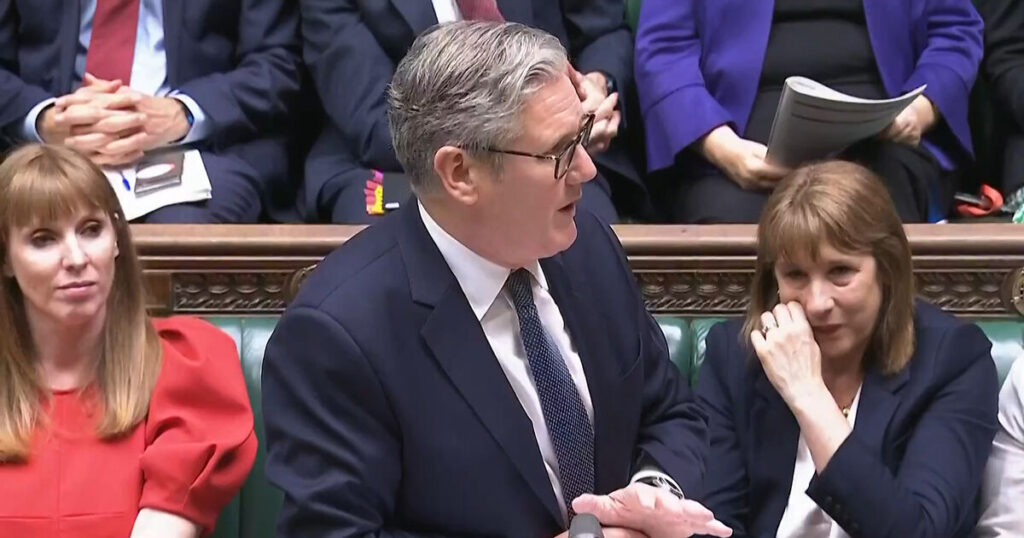Keir Starmer has declared Rachel Reeves will be Britain’s Chancellor for a “very long time to come,” following her tearful appearance during Prime Minister’s Questions.
The Prime Minister stated it was “absolutely wrong” to suggest the Chancellor’s emotional state in the House of Commons was linked to the welfare U-turn, which reportedly created a near £5bn shortfall in her financial plans.
“It’s got nothing to do with politics, nothing to do with what’s happened this week. It was a personal matter for her.
“I’m not going to intrude on her privacy by talking to you about that. It is a personal matter,” he clarified during an interview for the BBC’s Political Thinking podcast with Nick Robinson.
When asked if Ms. Reeves would remain in her position, Mr. Starmer responded: “She will be Chancellor by the time this is broadcast, she will be Chancellor for a very long time to come, because this project that we’ve been working on to change the Labour party, to win the election, change the country, that is a project which the Chancellor and I’ve been working on together.”
Mr. Starmer also told the BBC that the Chancellor has done a “fantastic job,” adding: “She and I work together, we think together. In the past, there have been examples — I won’t give any specific — of chancellors and prime ministers who weren’t in lockstep. We’re in lockstep.”
Reports indicated that markets reacted nervously to the images of Ms. Reeves’s distress, resulting in a decline in the value of the pound and a sharp drop in long-term Government bond prices.
During the Commons session, Tory leader Kemi Badenoch commented that Ms. Reeves looked “absolutely miserable” and challenged Mr. Starmer to confirm whether she would retain her role until the next election.
Mr. Starmer avoided a direct answer regarding Ms. Reeves’s tenure, stating that Mrs. Badenoch “certainly won’t” hold her position.
Downing Street subsequently asserted that Ms. Reeves was “going nowhere” and would continue as Chancellor.
Sources close to Ms. Reeves cited a “personal matter” when questioned about her emotional state.
Mr. Starmer, who reportedly stumbled while entering Downing Street for Prime Minister’s Questions, faced scrutiny over his management of a welfare reform package. Key elements of this package were removed to mitigate a potential Labour rebellion.
Plans to tighten eligibility criteria for the Personal Independence Payment (PIP) were withdrawn on Tuesday, just 90 minutes before a parliamentary vote. This effectively eliminated the savings Ms. Reeves had anticipated using to fund day-to-day spending through tax revenue rather than borrowing.
As Ms. Reeves left the Commons following Prime Minister’s Questions, her sister, Ellie Reeves, offered her support by taking her hand.
Speculation arose suggesting Ms. Reeves had engaged in a disagreement with Commons Speaker Lindsay Hoyle shortly before Prime Minister’s Questions.
Reportedly, Mr. Hoyle had reprimanded Ms. Reeves for her handling of Treasury Questions earlier in the week, to which the Chancellor allegedly responded that she had been “under so much pressure.”
A spokeswoman for Mr. Hoyle stated: “No comment.”
When asked why Mr. Starmer did not publicly affirm his faith in Ms. Reeves during the Commons debate, his press secretary told reporters: “He has done so repeatedly.
“The Chancellor is going nowhere. She has the prime minister’s full backing.
“He has said it plenty of times, he doesn’t need to repeat it every time the Leader of the Opposition speculates about Labour politicians.”
In response to a question about Mr. Starmer’s confidence in Work and Pensions Secretary Liz Kendall, the press secretary affirmed: “Yes.”
Labour has pledged not to increase income tax, employee national insurance contributions, or VAT, which limits Ms. Reeves’s options for generating revenue through tax increases.
Helen Miller, the incoming director of the Institute for Fiscal Studies, commented: “Since departmental spending plans are now effectively locked in, and the Government has already had to row back on planned cuts to pensioner benefits and working-age benefits, tax rises would look increasingly likely.
“This will doubtless intensify the speculation over the summer about which taxes may rise and by how much.”
Mr. Starmer declined to rule out future tax increases, telling MPs: “No prime minister or chancellor ever stands at the despatch box and writes budgets in the future.”


